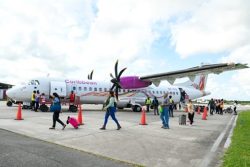Dear Editor,
Guyana could be producing as much as 1 million bpd oil by 2030, and Rystad Energy predicts that by 2033 Guyana could become the second largest deep-water crude oil producer in the world. The economy has begun to experience unprecedented growth and big shifts in the economy between oil and other sectors. According to the IMF the country’s GDP per capita will move from among the lowest in Latin America and the Caribbean (LAC) in 2019 to among the top ten in LAC by 2026. By then it could be about 2½ times that of Jamaica’s and within reach of Trinidad and Tobago’s. Guyana is at a point of great potential, but it also faces complex challenges and risks, and policymakers have no experience in managing the forthcoming unprecedented growth in activity and wealth, nor the associated risks. Currently, the annual budget is the most important mechanism for setting policy measures and targets. The budget for 2022 sets out an ambitious spending programme, but the scarcity of skills in the central government and weak accountability could lead to waste and corruption. A 2018 report by the IDB noted that public
expenditure had weak oversight, and that “… multiple capital projects are delayed, over- budgeted, or sub-standard in quality once completed.” In such an environment, allocating oil revenues between spending and saving, prioritizing expenditure, and avoiding waste are major challenges. So is the challenge of protecting Guyana’s fragile coastal environment. In addition, oil-producing economies like Guyana run the risk that the non-oil part of the economy could be weakened by high costs and falling competitiveness.
An economic policy advisory body on the economy could strengthen the policymaking process by broadening the pool of expertise to address the challenges and risks. Several countries have established advisory bodies on the economy. In Jamaica, the Economic Policy Oversight Committee (EPOC) was set up in 2013 as an independent body to monitor the government’s compliance with its programme with the IMF. On completion of the programme in 2019 EPOC was asked by the government to continue to monitor the reform programme. EPOC comprises 11 members, is chaired by an executive of a private financial institution, and has representatives from the business and banking community, the public sector, labour, and civil society. Meetings are held quarterly, with a technical committee meeting monthly, and EPOC issues press releases and quarterly reports on the economy to the public. The rationale for advisory bodies is that as economies become larger and more complex, governments need to consult on a structured and continuous basis with a broad range of expertise outside of government to design policies and address risks. These bodies bring to bear a richer knowledge-base and views from a wide range of stakeholders in addressing problems and developing solutions. Also, they help promote dialogue among different groups of stakeholders. Transparency is a key feature of advisory bodies. In many countries advisory bodies are allowed to publish advice given to governments.
In Guyana’s case an economic policy advisory body could be convened by the President, with representatives from the private sector, labour, and civil society. It would take into account the work of other advisory or consultative bodies to avoid duplication. Some key features could include the following:
● It would be operationally independent and multi-disciplinary, comprising professional men and women in fields such as business and finance, law, technology, economics, social development, infrastructure, climate and the environment, and public services;
● Members would be diverse and politically independent, appointed for a period of two years, and guided by a code of conduct to govern matters such as conflicts of interest and ethics;
● The body would be supported by a small secretariat to provide research and reporting services; and
● The body would report to the press on its meetings and recommendations, and issue periodic reports to the public summarizing its work.
Guyana is on the brink of unprecedented economic change alongside considerable challenges and risks. Addressing this requires an improv-ed framework for policymaking which brings together a broader pool of knowledge and expertise. An economic policy advisory body can help meet that need.
Sincerely,
M. DaCosta,
K. Dublin,
S. Williams





